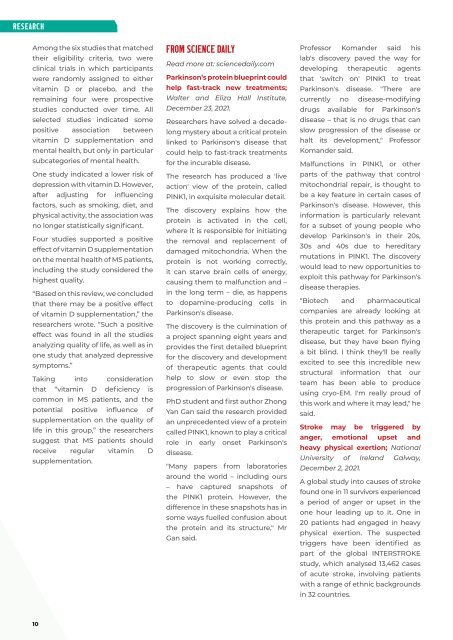MSWA Bulletin Magazine Summer 2022
Keeping your cool this summer | Welcome Melanie Kiely CEO | MSWA Stationary Cycle results | Pain and pain management series: Part 3
Keeping your cool this summer | Welcome Melanie Kiely CEO | MSWA Stationary Cycle results | Pain and pain management series: Part 3
Create successful ePaper yourself
Turn your PDF publications into a flip-book with our unique Google optimized e-Paper software.
RESEARCH<br />
Among the six studies that matched<br />
their eligibility criteria, two were<br />
clinical trials in which participants<br />
were randomly assigned to either<br />
vitamin D or placebo, and the<br />
remaining four were prospective<br />
studies conducted over time. All<br />
selected studies indicated some<br />
positive association between<br />
vitamin D supplementation and<br />
mental health, but only in particular<br />
subcategories of mental health.<br />
One study indicated a lower risk of<br />
depression with vitamin D. However,<br />
after adjusting for influencing<br />
factors, such as smoking, diet, and<br />
physical activity, the association was<br />
no longer statistically significant.<br />
Four studies supported a positive<br />
effect of vitamin D supplementation<br />
on the mental health of MS patients,<br />
including the study considered the<br />
highest quality.<br />
“Based on this review, we concluded<br />
that there may be a positive effect<br />
of vitamin D supplementation,” the<br />
researchers wrote. “Such a positive<br />
effect was found in all the studies<br />
analyzing quality of life, as well as in<br />
one study that analyzed depressive<br />
symptoms.”<br />
Taking into consideration<br />
that “vitamin D deficiency is<br />
common in MS patients, and the<br />
potential positive influence of<br />
supplementation on the quality of<br />
life in this group,” the researchers<br />
suggest that MS patients should<br />
receive regular vitamin D<br />
supplementation.<br />
FROM SCIENCE DAILY<br />
Read more at: sciencedaily.com<br />
Parkinson’s protein blueprint could<br />
help fast-track new treatments;<br />
Walter and Eliza Hall Institute,<br />
December 23, 2021.<br />
Researchers have solved a decadelong<br />
mystery about a critical protein<br />
linked to Parkinson's disease that<br />
could help to fast-track treatments<br />
for the incurable disease.<br />
The research has produced a 'live<br />
action' view of the protein, called<br />
PINK1, in exquisite molecular detail.<br />
The discovery explains how the<br />
protein is activated in the cell,<br />
where it is responsible for initiating<br />
the removal and replacement of<br />
damaged mitochondria. When the<br />
protein is not working correctly,<br />
it can starve brain cells of energy,<br />
causing them to malfunction and –<br />
in the long term – die, as happens<br />
to dopamine-producing cells in<br />
Parkinson's disease.<br />
The discovery is the culmination of<br />
a project spanning eight years and<br />
provides the first detailed blueprint<br />
for the discovery and development<br />
of therapeutic agents that could<br />
help to slow or even stop the<br />
progression of Parkinson's disease.<br />
PhD student and first author Zhong<br />
Yan Gan said the research provided<br />
an unprecedented view of a protein<br />
called PINK1, known to play a critical<br />
role in early onset Parkinson's<br />
disease.<br />
"Many papers from laboratories<br />
around the world – including ours<br />
– have captured snapshots of<br />
the PINK1 protein. However, the<br />
difference in these snapshots has in<br />
some ways fuelled confusion about<br />
the protein and its structure," Mr<br />
Gan said.<br />
Professor Komander said his<br />
lab's discovery paved the way for<br />
developing therapeutic agents<br />
that 'switch on' PINK1 to treat<br />
Parkinson's disease. "There are<br />
currently no disease-modifying<br />
drugs available for Parkinson's<br />
disease – that is no drugs that can<br />
slow progression of the disease or<br />
halt its development," Professor<br />
Komander said.<br />
Malfunctions in PINK1, or other<br />
parts of the pathway that control<br />
mitochondrial repair, is thought to<br />
be a key feature in certain cases of<br />
Parkinson's disease. However, this<br />
information is particularly relevant<br />
for a subset of young people who<br />
develop Parkinson's in their 20s,<br />
30s and 40s due to hereditary<br />
mutations in PINK1. The discovery<br />
would lead to new opportunities to<br />
exploit this pathway for Parkinson's<br />
disease therapies.<br />
"Biotech and pharmaceutical<br />
companies are already looking at<br />
this protein and this pathway as a<br />
therapeutic target for Parkinson's<br />
disease, but they have been flying<br />
a bit blind. I think they'll be really<br />
excited to see this incredible new<br />
structural information that our<br />
team has been able to produce<br />
using cryo-EM. I'm really proud of<br />
this work and where it may lead," he<br />
said.<br />
Stroke may be triggered by<br />
anger, emotional upset and<br />
heavy physical exertion; National<br />
University of Ireland Galway,<br />
December 2, 2021.<br />
A global study into causes of stroke<br />
found one in 11 survivors experienced<br />
a period of anger or upset in the<br />
one hour leading up to it. One in<br />
20 patients had engaged in heavy<br />
physical exertion. The suspected<br />
triggers have been identified as<br />
part of the global INTERSTROKE<br />
study, which analysed 13,462 cases<br />
of acute stroke, involving patients<br />
with a range of ethnic backgrounds<br />
in 32 countries.<br />
10

















